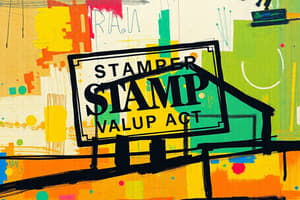Podcast
Questions and Answers
What type of property right gives permanent and absolute ownership of property?
What type of property right gives permanent and absolute ownership of property?
- Shared Ownership
- Freehold (correct)
- Leasehold
- Tenancy
What document contains information about a property, including ownership and any liabilities?
What document contains information about a property, including ownership and any liabilities?
- Will
- Succession Certificate
- 7/12 Extract (correct)
- Sale Deed
What clause in a property document protects the buyer from any losses or damages caused by the seller's failure to disclose information?
What clause in a property document protects the buyer from any losses or damages caused by the seller's failure to disclose information?
- Dispute Resolution Clause
- Warranty Clause
- Ownership Clause
- Indemnity Clause (correct)
According to the Hindu Succession Act, 1956, which group of people has equal rights in ancestral property?
According to the Hindu Succession Act, 1956, which group of people has equal rights in ancestral property?
What type of property right gives a person the right to occupy a property for a specific period, usually in exchange for rent?
What type of property right gives a person the right to occupy a property for a specific period, usually in exchange for rent?
What document establishes the legal heirs of a deceased person and their right to inherit property?
What document establishes the legal heirs of a deceased person and their right to inherit property?
What clause in a property document guarantees the seller's ownership of the property and ensures the buyer's rights?
What clause in a property document guarantees the seller's ownership of the property and ensures the buyer's rights?
What type of property right gives a person the right to use a property for a specific period, but does not provide ownership?
What type of property right gives a person the right to use a property for a specific period, but does not provide ownership?
What document transfers ownership of a property from one person to another?
What document transfers ownership of a property from one person to another?
What clause in a property document outlines the process for resolving disputes between the buyer and seller?
What clause in a property document outlines the process for resolving disputes between the buyer and seller?
Flashcards are hidden until you start studying
Study Notes
Property Rights in Maharashtra
Types of Property Rights:
- Freehold: Permanent and absolute ownership of property.
- Leasehold: Property owned by one party, but another party has the right to use it for a specific period.
- Tenancy: A person has the right to occupy a property for a specific period, usually in exchange for rent.
Documents Required for Property Rights:
- 7/12 Extract: A document that contains information about the property, including ownership and any liabilities.
- Sale Deed: A legal document that transfers ownership of a property from one person to another.
- Will: A legal document that specifies how a person's property will be distributed after their death.
- Succession Certificate: A document that establishes the legal heirs of a deceased person and their right to inherit property.
Important Clauses in Property Documents:
- Indemnity Clause: A clause that protects the buyer from any losses or damages caused by the seller's failure to disclose information.
- Warranty Clause: A clause that guarantees the seller's ownership of the property and ensures the buyer's rights.
- Dispute Resolution Clause: A clause that outlines the process for resolving disputes between the buyer and seller.
Rights of Women in Property:
- Hindu Succession Act, 1956: Gives equal rights to daughters in ancestral property.
- Maharashtra Revenue Code, 1966: Allows women to inherit property and have equal rights in agricultural land.
Important Acts and Amendments:
- The Maharashtra Land Revenue Code, 1966: Regulates land revenue, including property rights and ownership.
- The Registration Act, 1908: Mandates registration of property documents to ensure authenticity and transparency.
Key Concepts:
- Adverse Possession: A situation where a person occupies a property without the owner's consent, and can eventually gain legal ownership.
- Easement: A right to use someone else's property for a specific purpose, such as a right of way.
Types of Property Rights
- Freehold: Permanent and absolute ownership of property, where the owner has full control and rights over the property.
- Leasehold: Property owned by one party, but another party has the right to use it for a specific period, usually in exchange for rent.
- Tenancy: A person has the right to occupy a property for a specific period, usually in exchange for rent.
Documents Required for Property Rights
- 7/12 Extract: A document that contains information about the property, including ownership and any liabilities, such as outstanding debts or mortgages.
- Sale Deed: A legal document that transfers ownership of a property from one person to another, providing proof of ownership.
- Will: A legal document that specifies how a person's property will be distributed after their death, outlining the wishes of the deceased.
- Succession Certificate: A document that establishes the legal heirs of a deceased person and their right to inherit property.
Important Clauses in Property Documents
- Indemnity Clause: A clause that protects the buyer from any losses or damages caused by the seller's failure to disclose information, ensuring the buyer's rights.
- Warranty Clause: A clause that guarantees the seller's ownership of the property and ensures the buyer's rights, providing assurance of the property's title.
- Dispute Resolution Clause: A clause that outlines the process for resolving disputes between the buyer and seller, providing a clear procedure for addressing issues.
Rights of Women in Property
- Hindu Succession Act, 1956: Gives equal rights to daughters in ancestral property, ensuring they have the same inheritance rights as sons.
- Maharashtra Revenue Code, 1966: Allows women to inherit property and have equal rights in agricultural land, promoting gender equality.
Important Acts and Amendments
- The Maharashtra Land Revenue Code, 1966: Regulates land revenue, including property rights and ownership, outlining the rules and procedures for land use.
- The Registration Act, 1908: Mandates registration of property documents to ensure authenticity and transparency, providing a public record of property transactions.
Key Concepts
- Adverse Possession: A situation where a person occupies a property without the owner's consent, and can eventually gain legal ownership through continuous occupation.
- Easement: A right to use someone else's property for a specific purpose, such as a right of way, providing access to a property or resource.
Studying That Suits You
Use AI to generate personalized quizzes and flashcards to suit your learning preferences.




